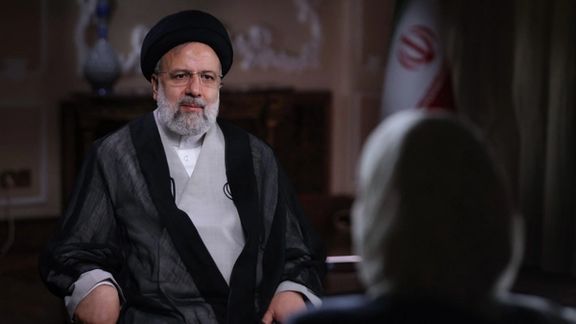Raisi Says Iran Wants 'Guarantees' From West For Nuclear Deal

President Ebrahim Raisi has said Iran is ready to revive the 2015 nuclear agreement given guarantees that the United States and Europe will uphold it.

President Ebrahim Raisi has said Iran is ready to revive the 2015 nuclear agreement given guarantees that the United States and Europe will uphold it.
In two television interviews ahead of leaving Monday for the United Nations General Assembly (UNGA) in New York, where he is due to speak this week, Raisi stressed Tehran’s lack of trust in both Washington and European states. This, he said, followed US withdrawal from the 2015 deal – the JCPOA, Joint Comprehensive Plan of Action – and Europe’s failure to support Iran economically in the face of US ‘maximum pressure’ sanctions.
Speaking last Tuesday to America’s CBS in Tehran in an interview broadcast over ten minutes Sunday, and to Qatar’s al-Jazeera in a half-hour slot Friday in Samarkand during the Shanghai Cooperation Organization (SCO) summit, Raisi said that while Iran wanted to expand trade globally with sanctions lifted it was ready to emphasize links with other countries facing sanctions.
“If there were guarantees, then the Americans could not withdraw from the deal,” Raisi said. “The Americans broke their promises, they did it unilaterally…We cannot trust the Americans because of the behavior we have already seen from them.”
CBS billed the interview as Raisi’s “first with a western reporter” while Raisi might receive more media coverage while in New York.
Meeting Biden ‘not beneficial’
Asked about Iranian-Americans detained in Iran, Raisi referred to Iranian nationals imprisoned in the US “because they tried to circumvent sanctions.” He reiterated talks “between the two countries” on this “humanitarian issue” were possible aside from the nuclear talks.
Raisi ruled out a “face to face” meeting in New York with President Joe Biden, which he said “would not be beneficial” as Iran had “not witnessed in reality” any changes since the administration of President Donald Trump, who in 2018 withdrew the US from the nuclear agreement and imposed ‘maximum pressure.’ But Iran’s foreign ministry spokesman Nasser Kanaani on Monday kept the door open to contacts during the UN summit.
Interviewer Lesley Stahl quizzed Raisi over 1988 prison executions, at time when the president was deputy prosecutor in Tehran. Raisi dismissed “allegations and claims made by a terrorist group” – the Mujahideen-e Khalq, whose members were most of those executed. CBS highlighted Amnesty International calling the executions as “a crime against humanity.”
Quizzed over the Jewish holocaust and Israel’s “right to exist,” Raisi evaded the question by bringing up the rights of Palestinians “forced to leave their homes and motherland,” and said Israel’s accords with some Arab states meant those states “were stabbing the very idea of Palestine in the back.” He also called for “justice” over the “heinous crime” of the US 2020 killing of Iranian general Qasem Soleimani.
Building confidence
Raisi’s interview with Jazeera focused on Iran’s strategy in looking to expand ties with other SCO members – China, India, the Kyrgyz Republic, Kazakhstan, Pakistan, Russia Tajikistan, and Uzbekistan – to create “balance” and as a bulwark against current or future US sanctions.
“Those who are violators of their commitment, they need to build confidence again,” he said. Asked over 40 years of poor relations with the US, Raisi evoked US support for the ‘terrorist’ MEK, for Saddam Hussein during the 1980-88 war, its 1988 shooting down of the civilian Iran Air Flight 655, and decades of sanctions – all of which he called a “very long list.”
In fact, the Soviet Union rendered greater support to Iraq with large arms shipments, but the Islamic Republic maintained ties with Moscow and later expanded relations. Also, there is no evidence of the US administrations having helped the MEK, although some US lawmakers support the organization.